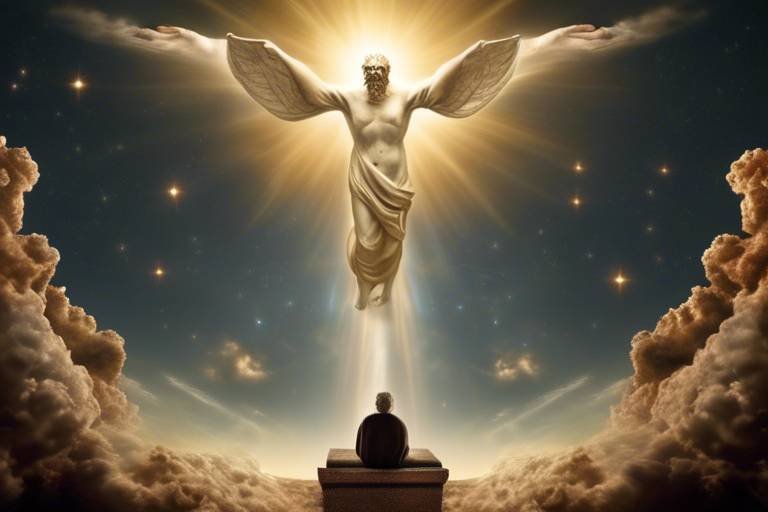Ontological Arguments for the Existence of God
Throughout history, the question of God's existence has sparked intense philosophical debate, and one of the most intriguing avenues in this discourse is the ontological argument. This argument is not just a casual assertion; it delves deep into the very essence of existence and what it means for something to be considered real. Imagine trying to prove the existence of something that transcends our physical reality—sounds challenging, right? Yet, this is exactly what ontological arguments aim to tackle.
At its core, the ontological argument posits that the very definition of God as the greatest conceivable being necessitates His existence. If we can conceive of a being greater than any other, then that being must exist in reality; otherwise, it wouldn't be the greatest. It’s a fascinating paradox that forces us to reconsider our understanding of existence and non-existence. The implications of this argument stretch far beyond mere semantics, challenging our perceptions of reality itself.
To fully appreciate the depth of ontological arguments, we must first grasp the concept of ontology. Ontology, a branch of metaphysics, investigates the nature of being and existence. It raises profound questions like: What does it mean to exist? Is existence a property? By exploring these questions, we can better understand why ontological arguments have been pivotal in theological and philosophical discussions.
As we navigate through the history of ontological arguments, we encounter a rich tapestry woven by thinkers from various eras, each contributing their unique perspectives and interpretations. From Anselm's medieval musings to modern philosophical inquiries, the evolution of this argument reflects our changing understanding of existence and divinity. It’s as if we are on a quest, with each philosopher acting as a guide, leading us closer to the truth about God’s existence.
In this article, we will explore the historical background of ontological arguments, delve into Anselm's original formulation, scrutinize critiques from prominent philosophers, and examine modern interpretations that breathe new life into these age-old discussions. By the end, we hope to unveil the complexities and nuances of ontological arguments, providing a clearer picture of their relevance in today’s philosophical landscape.
- What is the ontological argument? The ontological argument is a philosophical argument that asserts that God’s existence is self-evident from the very definition of God as the greatest conceivable being.
- Who first proposed the ontological argument? The ontological argument was first formulated by Anselm of Canterbury in the 11th century.
- What are some critiques of the ontological argument? Critics like Gaunilo and Kant have challenged the argument by questioning the leap from conceptual existence to actual existence.
- How do modern philosophers view the ontological argument? Many contemporary philosophers revisit Anselm's argument, offering new interpretations and defenses that reflect current philosophical thought.

The Concept of Ontology
Ontology is a fascinating branch of metaphysics that dives deep into the nature of being and existence. Think of it as the philosophical detective work that seeks to answer questions about what it means to "be." At its core, ontology asks profound questions such as: What entities exist? How do they exist? And what does it mean for something to be real? This inquiry is not just academic; it has significant implications for various fields, including theology, science, and even everyday life.
To truly grasp the significance of ontological arguments in the discourse on God's existence, we must first understand a few key concepts within ontology. These include:
- Existence: What does it mean for something to exist? Is existence a property, or is it merely a way of describing the state of being?
- Essence: This refers to the fundamental nature or characteristic of something. For example, what is the essence of a tree? Is it its physical structure, its ability to photosynthesize, or something more abstract?
- Identity: How do we determine the identity of an object? What makes a particular apple distinct from another apple?
These concepts are not just academic jargon; they form the foundation upon which ontological arguments are built. When philosophers like Anselm and Descartes ventured into discussions about God's existence, they were essentially grappling with these ontological questions. They sought to show that God, as the greatest conceivable being, must exist in some form, and their arguments hinge on the very nature of existence itself.
Moreover, ontology doesn't just deal with abstract ideas; it also impacts how we perceive the world around us. For instance, consider the implications of saying that something exists versus saying that it does not. This distinction can influence everything from scientific inquiry to personal beliefs. In a world where so much is uncertain, ontology provides a framework for understanding the very fabric of reality.
In summary, ontology is not merely a philosophical curiosity; it is a crucial lens through which we can explore the existence of God and the nature of reality itself. As we move forward in this article, we'll see how ontological arguments have evolved and how they continue to challenge and inspire thinkers today.

Historical Background
The ontological argument has a rich and fascinating history, tracing its roots back to medieval philosophy. One of the earliest and most significant proponents of this argument was Anselm of Canterbury, who lived in the 11th century. Anselm's groundbreaking work, the "Proslogion," introduced a form of the ontological argument that would spark centuries of debate among philosophers, theologians, and scholars alike. His assertion was that God is "that than which nothing greater can be conceived," and if such a being exists in the mind, it must also exist in reality; otherwise, it wouldn't be the greatest conceivable being. This was a radical idea at the time, as it shifted the focus from empirical evidence to a more abstract, conceptual understanding of existence.
Following Anselm, the ontological argument continued to evolve through the contributions of various thinkers. In the 12th century, philosopher Gaunilo of Marmoutiers, a contemporary of Anselm, challenged this argument by proposing a counterexample known as the "perfect island." Gaunilo argued that if one could conceive of a perfect island, it does not necessarily follow that such an island exists in reality. This critique marked the beginning of a long-standing dialogue about the validity and soundness of ontological reasoning, prompting further refinements and defenses of the argument.
As we moved into the 17th century, the renowned philosopher René Descartes expanded on Anselm's ideas, providing a new formulation of the ontological argument. Descartes posited that existence is a necessary attribute of a supremely perfect being, thus reinforcing the concept that God must exist. His contributions added a layer of complexity to the argument, emphasizing the necessity of God's existence rather than merely the possibility.
The Enlightenment era saw a surge of skepticism towards traditional ontological arguments, particularly from influential philosophers like Immanuel Kant. Kant argued that existence is not a predicate and that one cannot define something into existence. His critiques prompted a reevaluation of the ontological argument's foundations, leading to a divide between those who defended it and those who dismissed it as flawed reasoning.
Throughout the 19th and 20th centuries, the ontological argument continued to be a topic of interest. Philosophers such as Gottfried Wilhelm Leibniz and later, Alvin Plantinga, introduced innovative perspectives that drew on concepts of possible worlds and modal logic. These modern interpretations have breathed new life into the ontological argument, making it a relevant topic in contemporary philosophical discussions.
In summary, the historical background of the ontological argument is marked by a series of influential thinkers who have shaped its development over the centuries. From Anselm's original formulation to modern adaptations, the argument has undergone rigorous scrutiny and debate, reflecting the evolving nature of philosophical inquiry into the existence of God.
- What is the ontological argument? The ontological argument is a philosophical argument for the existence of God that uses abstract reasoning rather than empirical evidence.
- Who first proposed the ontological argument? The ontological argument was first formulated by Anselm of Canterbury in the 11th century.
- What are some critiques of the ontological argument? Critics like Gaunilo and Kant have challenged the argument, claiming that existence cannot be defined into being and providing counterexamples.
- How have modern philosophers interpreted the ontological argument? Modern philosophers like Alvin Plantinga have revisited the argument, incorporating modal logic and concepts of possible worlds to defend its relevance.

Anselm's Argument
At the heart of the ontological argument lies the profound reasoning of Anselm of Canterbury, a medieval philosopher who introduced a groundbreaking perspective on the existence of God. Anselm's argument is elegantly simple yet deeply profound: he posits that God is "that than which nothing greater can be conceived." This definition sets the stage for his assertion that God must exist not only in the mind but also in reality. Why? Because if God existed solely in the mind, then a greater being could be imagined—one that exists in reality. This leads to the inescapable conclusion that God must exist in both realms.
To delve deeper into Anselm's reasoning, consider the following points:
- Existence as a Perfection: Anselm argues that existence is a perfection. Thus, if God is the greatest conceivable being, He must possess all perfections, including existence.
- Concept of God: If one can conceive of such a being as God, then He must exist in some form, or else the very concept is flawed.
- Logical Necessity: Anselm claims that if God can be conceived as existing, then it follows logically that He exists necessarily, not just contingently.
What makes Anselm's argument particularly captivating is its reliance on pure logic rather than empirical evidence. Anselm believed that faith and reason are not mutually exclusive; rather, they complement one another in the quest for truth. His argument invites us to reflect on the nature of existence itself and challenges us to consider the implications of a being that exists beyond our comprehension.
However, Anselm's argument is not without its critics. Philosophers like Gaunilo and Kant have raised significant objections. Gaunilo, for instance, proposed a counterexample involving a perfect island, suggesting that just because one can conceive of a perfect island does not mean it exists. Kant, on the other hand, argued that existence is not a predicate or a property that can be attributed to a being. These critiques have sparked extensive debate and further examination of Anselm's ideas, demonstrating the argument's complexity and the passion it ignites in philosophical circles.
In essence, Anselm's ontological argument serves as a foundational stone in the discourse surrounding the existence of God. It not only challenges our understanding of existence but also invites us to engage with the deeper philosophical questions that have intrigued humanity for centuries. As we explore further into the realm of ontological arguments, we find ourselves wrestling with ideas that straddle the line between faith and reason, pushing us to confront our beliefs and the nature of reality itself.
- What is the main premise of Anselm's argument? Anselm's argument asserts that God, defined as the greatest conceivable being, must exist in reality because existence is a perfection.
- How does Anselm's argument differ from other arguments for God's existence? Unlike cosmological or teleological arguments, Anselm's argument is purely a priori and relies on logical deduction rather than empirical evidence.
- What are some common objections to Anselm's argument? Critics like Gaunilo and Kant argue that existence cannot be treated as a perfection and that conceptualizing a perfect being does not necessitate its actual existence.

Critiques of Anselm
Despite the profound influence of Anselm's ontological argument on philosophical discourse, it has not gone without its fair share of criticism. One of the earliest and most notable critiques came from the monk Gaunilo, who argued that Anselm's reasoning could be applied to anything conceivable, not just God. Gaunilo suggested that if we can define a perfect island as the greatest conceivable island, it should also exist in reality. This analogy raises an intriguing question: can we truly apply the same logic to all entities, or is there something uniquely divine about the concept of God?
Another significant critique was presented by the German philosopher Immanuel Kant, who argued that existence is not a predicate. According to Kant, saying that something exists does not add to its essence; it merely posits that it is present in reality. This leads to the conclusion that Anselm's argument fails because it attempts to define God into existence rather than demonstrating His existence through empirical evidence or logical necessity. Kant's perspective invites us to consider whether we can truly assert the existence of any being based solely on conceptual definitions.
In addition to Gaunilo and Kant, other philosophers have raised objections that challenge the internal coherence of Anselm's argument. Some argue that the very definition of God as the greatest conceivable being is subjective and varies from person to person. This subjectivity leads to questions about whether a universally accepted definition of God can even be established. If we cannot agree on what constitutes the "greatest conceivable being," how can we claim that such a being must exist?
Furthermore, the ontological argument has been critiqued for its reliance on abstract reasoning, which some philosophers deem insufficient for establishing the existence of a being. Critics argue that while the argument may be logically sound, it does not account for the complexities of existence itself. They suggest that existence is not merely a logical construct but a tangible reality that requires more than just philosophical musings to affirm.
In light of these critiques, it's essential to recognize that the ontological argument, while historically significant, is not without its flaws. The discussions surrounding Anselm's argument have paved the way for further exploration of the nature of existence and the divine. This ongoing debate continues to inspire both defenders and critics of the ontological argument, illustrating the dynamic nature of philosophical inquiry.
- What is the ontological argument? The ontological argument is a philosophical argument for the existence of God that uses the concept of God as the greatest conceivable being to assert that such a being must exist in reality.
- Who first proposed the ontological argument? The ontological argument was first proposed by Anselm of Canterbury in the 11th century.
- What are the main critiques of Anselm's argument? The main critiques include Gaunilo's analogy of the perfect island, Kant's assertion that existence is not a predicate, and the subjective nature of defining God.
- How does modern philosophy view the ontological argument? Modern philosophy has seen a resurgence of interest in the ontological argument, with various philosophers offering new interpretations and defenses, despite the critiques it has faced.

Modern Interpretations
The ontological argument, originally articulated by Anselm, has undergone various transformations and reinterpretations in modern philosophy. Contemporary thinkers have taken Anselm's foundational ideas and explored them through new lenses, often incorporating advancements in logic and metaphysics. One key aspect of these modern interpretations is the use of modal logic, which provides a more structured framework for discussing possibility and necessity. This approach allows philosophers to rigorously analyze the conditions under which God's existence can be affirmed.
For instance, philosophers like Alvin Plantinga have made significant contributions by developing what is known as the modal ontological argument. Plantinga argues that if it is possible that a maximally great being exists, then that being must exist in some possible world. This assertion hinges on the idea that existence in all possible worlds entails existence in the actual world. His argument has sparked extensive debate, leading to a renewed interest in the ontological argument among both supporters and critics.
Moreover, modern interpretations often emphasize the importance of conceptual analysis. Philosophers today engage in a more rigorous examination of the definitions and implications of the terms involved in the ontological argument. By scrutinizing what we mean by "God," "existence," and "perfection," they aim to clarify the logical structure of the argument and its potential pitfalls. This careful analysis has led to various refinements and alternative formulations that attempt to address the criticisms raised against earlier versions of the argument.
Another significant contribution to the modern discourse on ontological arguments comes from the realm of analytic philosophy. Thinkers in this tradition often focus on the linguistic and logical aspects of the argument. They argue that the way we articulate the ontological argument can significantly influence its persuasiveness and validity. For example, some modern philosophers suggest that the argument should be framed in a way that makes its implications clearer, potentially making it more accessible to a wider audience.
In addition, the rise of existential philosophy has also influenced contemporary views on the ontological argument. Existentialists often challenge the notion of a static, necessary being, arguing instead for a more dynamic understanding of existence that emphasizes human experience and subjectivity. This perspective invites a reevaluation of the ontological argument, prompting discussions about whether such abstract reasoning can truly capture the essence of God as experienced in the world.
In summary, modern interpretations of the ontological argument reflect a rich tapestry of thought, integrating insights from modal logic, analytic philosophy, and existentialism. As these discussions continue to evolve, the ontological argument remains a vital part of the philosophical landscape, challenging us to consider the profound questions of existence and the nature of the divine.
- What is the ontological argument?
The ontological argument is a philosophical argument for the existence of God that uses the concept of being and existence itself as its basis. - Who first proposed the ontological argument?
The ontological argument was first formulated by Anselm of Canterbury in the 11th century. - What is modal logic?
Modal logic is a type of logic that deals with modes of truth, such as necessity and possibility, often used in modern interpretations of the ontological argument. - How has modern philosophy influenced the ontological argument?
Modern philosophy has introduced new methods of analysis, including modal logic and existential perspectives, which have reshaped the understanding and relevance of the ontological argument.

Descartes' Contribution
René Descartes, often hailed as the father of modern philosophy, brought a fresh perspective to the ontological argument that has intrigued scholars for centuries. His approach is not just a reiteration of Anselm's ideas; rather, it introduces a crucial element: the necessity of God's existence. Descartes argued that the very essence of God is that of a supremely perfect being. In his view, existence is a predicate of perfection. To put it simply, if we can conceive of a perfect being, then that being must exist. Why? Because a God that does not exist would be less perfect than one that does. This line of reasoning is encapsulated in his famous statement, “I think, therefore I am,” which emphasizes the act of thinking as proof of existence.
In Descartes' view, if we can imagine a God who possesses all perfections, then it follows that existence must be one of those perfections. To deny God's existence would be akin to denying that a triangle has three sides. This profound assertion presents a challenge to skeptics: if God is defined as a necessary being, then His existence is not merely a possibility; it is a necessity. Descartes' argument can be summarized through the following points:
- Essence of God: God is defined as a supremely perfect being.
- Existence as a Perfection: Existence is a necessary attribute of perfection.
- Logical Necessity: If we can conceive of a perfect being, it must exist in reality.
Descartes' argument, however, is not without its critics. Philosophers like Immanuel Kant later challenged the notion that existence is a predicate. Kant argued that existence does not add to the essence of a being; rather, it simply indicates the presence of that being in reality. This debate continues to spark discussions among modern philosophers, showcasing the enduring influence of Descartes' contributions to the ontological argument.
In summary, Descartes' unique interpretation of the ontological argument emphasizes the necessity of God's existence as an intrinsic aspect of His perfection. This perspective has not only enriched the philosophical discourse surrounding the existence of God but has also laid the groundwork for future explorations into the nature of being and existence itself.
- What is the ontological argument? The ontological argument is a philosophical reasoning that asserts the existence of God based on the concept of God as a perfect being.
- Who originally formulated the ontological argument? The argument was first formulated by Anselm of Canterbury in the 11th century.
- How did Descartes contribute to the ontological argument? Descartes expanded the argument by asserting that existence is a necessary attribute of a supremely perfect being.
- What are some criticisms of the ontological argument? Critics like Kant have argued that existence is not a predicate and does not add to the concept of a being.

Alternative Ontological Arguments
The quest for understanding the existence of God has led philosophers to explore a variety of ontological arguments beyond the foundational works of Anselm and Descartes. These alternative arguments not only enrich the discourse but also present unique perspectives that challenge and expand traditional views. Each thinker brings their own flavor to the table, aiming to bolster the case for God's existence through distinct philosophical lenses. For instance, some argue from the standpoint of necessity, while others delve into the realm of possible worlds. This section will survey these different perspectives, highlighting their contributions to the ongoing discussion about God's existence.
One of the most notable figures in this arena is Gottfried Wilhelm Leibniz, who approached the ontological argument through the lens of possible worlds. Leibniz posited that if God is the greatest conceivable being, then He must exist in every possible world. This means that God's existence is not just a matter of reality but also of potentiality. In his view, if there is even a slight possibility of God's existence, then He must exist in some form, as the greatest being cannot be contingent upon anything else. This idea leads us to think about existence in a more expansive way, one that transcends mere empirical evidence.
In contrast, Alvin Plantinga introduced a modal ontological argument that has gained traction in contemporary philosophy. Plantinga's argument hinges on modal logic, which deals with necessity and possibility. He asserts that if it is possible for God to exist, then there is at least one possible world in which God exists. This argument is compelling because it shifts the focus from proving God's existence in our world to exploring the implications of His existence across all possible worlds. By employing a logical framework, Plantinga provides a robust defense against critiques that have historically plagued ontological arguments.
To further illustrate the differences among these thinkers, let's consider a table that summarizes their key contributions:
| Philosopher | Key Argument | Focus |
|---|---|---|
| Anselm | Greatest conceivable being must exist | Existence in reality |
| Descartes | Existence is a perfection of God | Necessary existence |
| Leibniz | God exists in all possible worlds | Potentiality and necessity |
| Plantinga | If God is possible, He exists in some world | Modal logic |
These alternative ontological arguments demonstrate that the conversation surrounding God's existence is far from stagnant. Each philosopher's approach offers a unique angle, challenging us to think critically about the nature of existence itself. Are we merely observing reality, or are we engaging with the very essence of being? This is the beauty of philosophical inquiry—it invites us to question our assumptions and explore the depths of our understanding.
As we navigate through these complex ideas, it becomes clear that the ontological argument remains a vital part of philosophical discourse. Whether one agrees or disagrees with these arguments, they push us to ponder fundamental questions about existence, necessity, and the divine. The dialogue continues, and with it, the potential for new insights and revelations about the nature of God and our understanding of reality.
- What is the ontological argument? The ontological argument is a philosophical reasoning that attempts to prove the existence of God through the concept of being and existence itself.
- Who first proposed the ontological argument? The ontological argument was first formulated by Anselm of Canterbury in the 11th century.
- What are some critiques of the ontological argument? Critics like Gaunilo and Kant have argued against the validity of the argument, suggesting that existence cannot be simply defined into reality.
- How has the ontological argument evolved? Modern philosophers, such as Plantinga, have revisited and reformulated the argument using contemporary logic and concepts.

Leibniz's Perspective
Gottfried Wilhelm Leibniz, a towering figure in philosophy and mathematics, brought a fresh perspective to the ontological argument that diverged significantly from his predecessors. His approach is fascinating because it intertwines metaphysical concepts with a rigorous logical framework. At the heart of Leibniz's argument is the notion of **possible worlds**. He posits that if we can conceive of a perfect being—namely, God—then this being must exist in some possible world. But what does that really mean?
To unpack this, Leibniz argued that existence is a predicate of perfection. In his view, a being that possesses all perfections must not only exist in our world but also in every possible world. This leads to a crucial conclusion: if God's existence is possible, then He exists necessarily. In simpler terms, think of it like this: if you can imagine the ultimate superhero, capable of every conceivable power, then that superhero must exist in some realm of possibility, otherwise, they wouldn't truly be the ultimate superhero. This idea reshapes our understanding of existence from a mere attribute to an essential quality of the greatest conceivable being.
Leibniz's argument can be summarized in a few key points:
- If God is the greatest conceivable being, He must possess all perfections.
- Existence is a perfection.
- Therefore, God must exist in some possible world.
- If God exists in one possible world, He exists in all possible worlds, including our own.
This perspective not only strengthens the traditional ontological argument but also invites us to consider the nature of existence itself. Leibniz's work pushes us to think about the implications of existence beyond mere physical reality, encouraging a deeper philosophical inquiry into what it means for something to exist. His ideas have sparked significant debate among philosophers, prompting questions like: Can existence truly be considered a predicate? How do we reconcile the concept of possible worlds with our understanding of reality?
In conclusion, Leibniz's contribution to the ontological argument is a pivotal moment in the philosophy of religion. His emphasis on possible worlds and the necessity of God's existence challenges us to rethink our assumptions about reality and existence. By exploring these ideas, we not only engage with the rich tapestry of philosophical thought but also deepen our understanding of the divine and its implications for our world.
- What is the ontological argument? The ontological argument is a philosophical argument for the existence of God that uses the concept of being or existence as its foundation.
- How does Leibniz's perspective differ from Anselm's? While Anselm's argument focuses on God as the greatest conceivable being, Leibniz introduces the concept of possible worlds to strengthen the argument for God's necessary existence.
- What are possible worlds? Possible worlds are hypothetical scenarios or realities that encompass different ways things could have been, allowing for the exploration of existence beyond our actual world.
- Why is existence considered a perfection? In Leibniz's view, existence enhances the qualities of a being. A perfect being must possess all perfections, and existence is one of those essential qualities.

Plantinga's Modal Ontological Argument
Alvin Plantinga, a prominent contemporary philosopher, has revitalized the ontological argument through his modal ontological argument, which cleverly intertwines concepts from modal logic. At its core, Plantinga's argument asserts that if it is possible for a maximally great being—essentially, God—to exist, then such a being exists in some possible world. This is a significant twist because it shifts the discussion from mere existence to the realm of possibility, allowing for a broader interpretation of God's existence.
To break down his argument, Plantinga introduces a few key components:
- Maximally Great Being: This is defined as a being that possesses all perfections, including omnipotence, omniscience, and moral perfection.
- Possible Worlds: These are hypothetical scenarios that help philosophers discuss existence beyond our own reality.
- Existence in Some Possible World: If a maximally great being exists in at least one possible world, it must exist in all possible worlds, including our own.
Thus, Plantinga's argument can be summarized in a logical structure:
1. It is possible that a maximally great being exists. 2. If it is possible that a maximally great being exists, then it exists in some possible world. 3. If it exists in some possible world, it exists in every possible world. 4. If it exists in every possible world, then it exists in the actual world. 5. Therefore, a maximally great being (God) exists in the actual world.
This argument is particularly compelling because it does not rely on empirical evidence or specific religious texts; instead, it operates within the realm of logical possibility. Plantinga's approach invites us to consider the nature of existence itself and challenges us to think about what it means for something to be possible versus actual. It also opens the door for discussions about the nature of reality and the limits of human understanding.
However, like any philosophical argument, Plantinga's modal ontological argument is not without its critiques. Some philosophers question the leap from possibility to necessity, arguing that just because something is possible does not mean it must be actualized. Others challenge the very premise of the existence of a maximally great being, positing that our understanding of greatness may be subjective and culturally influenced.
In summary, Plantinga's modal ontological argument enriches the discourse surrounding the existence of God by introducing a fresh perspective that emphasizes the role of possibility in philosophical discussions. It encourages us to explore not just what exists in our world, but what could exist in a broader metaphysical context. This shift in focus opens up new avenues for understanding the divine and challenges us to reconsider our assumptions about existence itself.
- What is the modal ontological argument? The modal ontological argument is a philosophical argument that suggests if it is possible for a maximally great being (God) to exist, then God exists in some possible world, and consequently in our actual world.
- Who is Alvin Plantinga? Alvin Plantinga is a contemporary philosopher known for his work in epistemology, metaphysics, and the philosophy of religion, particularly his contributions to the ontological argument.
- What are possible worlds? Possible worlds are hypothetical scenarios used in modal logic to discuss the existence and properties of beings beyond our actual reality.
- What criticisms does Plantinga's argument face? Critics argue that just because something is possible does not mean it must exist, questioning the leap from possibility to necessity in Plantinga's reasoning.
Frequently Asked Questions
- What is the ontological argument?
The ontological argument is a philosophical reasoning that attempts to prove the existence of God through abstract concepts rather than empirical evidence. It primarily asserts that the very definition of God as the greatest conceivable being implies that God must exist in reality, as existing in reality is greater than existing merely in the mind.
- Who first proposed the ontological argument?
The ontological argument was first formulated by Anselm of Canterbury in the 11th century. Anselm's version of the argument emphasizes that if we can conceive of the greatest being, then that being must exist, as existence is a necessary attribute of greatness.
- What are some criticisms of Anselm's argument?
Critics like Gaunilo and Immanuel Kant have raised significant objections to Anselm's argument. Gaunilo argued that one could conceive of a perfect island that does not exist, suggesting that just because we can imagine something doesn't mean it exists. Kant, on the other hand, contended that existence is not a predicate or quality that enhances the concept of a being.
- How did Descartes contribute to the ontological argument?
René Descartes expanded on Anselm’s ideas by arguing that God's existence is necessary and that the concept of a perfect being inherently includes existence. Descartes believed that the clarity and distinctness of our idea of God necessitate His existence, making it impossible to conceive of God without acknowledging that He exists.
- What are some modern interpretations of the ontological argument?
Modern philosophers have revisited the ontological argument, offering new frameworks and defenses. For example, Alvin Plantinga introduced modal logic into the discussion, suggesting that if it's possible for God to exist, then God exists in some possible world. This approach has sparked renewed interest and debate among contemporary thinkers.
- What is Leibniz's perspective on the ontological argument?
Gottfried Wilhelm Leibniz provided a unique viewpoint by introducing the concept of possible worlds. He argued that God exists in the best of all possible worlds, and this existence is necessary to explain the existence of the universe as we know it. Leibniz's interpretation adds a layer of complexity to the traditional ontological arguments.
- Can the ontological argument be proven?
The ontological argument remains a topic of debate. While some philosophers assert that it provides a valid proof of God's existence, others argue that it relies too heavily on abstract reasoning and fails to address empirical evidence. Ultimately, whether it can be proven often depends on one's philosophical perspective and approach to metaphysics.



















